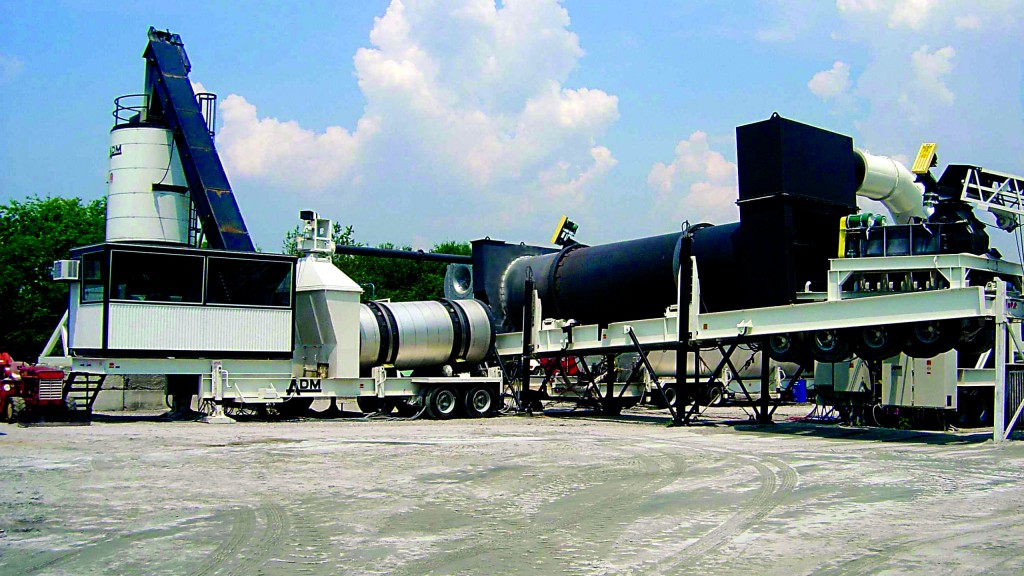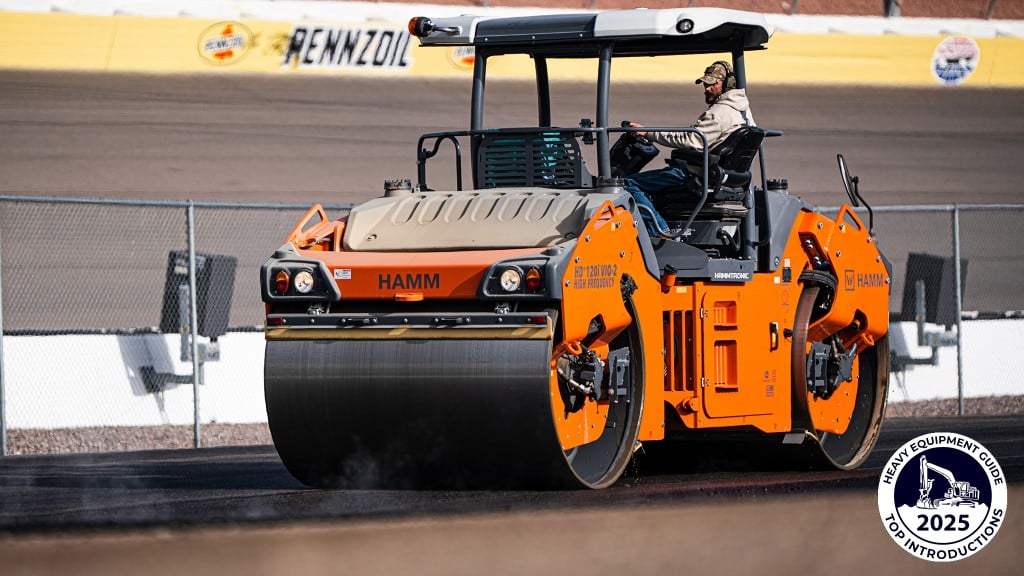To buy or not to buy: Paving contractors may want to consider owning their own asphalt plant to improve profits

Purchasing an asphalt plant is a serious decision for any company, small or large, as prices range from $500,000 to $4 million. However, there may be good reasons to consider the purchase. If you buy asphalt from a supplier, your truck drivers may have to wait in line to receive hot mix. Then they have to make the trip back to the worksite, which could be many kilometres away. Finally, the crew may be doing some waiting of its own; after all, work can’t progress without the hot mix, so the crew is stalled until the truck arrives. There is also the actual cost of the asphalt, something the receiving companies have no control over.
While all these inconveniences and cost issues may be frustrating, are they enough to justify purchasing an asphalt plant?
There are several factors to consider in deciding if owning an asphalt plant will meet your return on investment (ROI) expectations and if it will do so quickly enough. These include: the market, area competition, plant and permit costs, local environmental regulations, aggregate supplies and mix cost – just to name a few.
It may seem overwhelming but just take the process one step at a time. For those who already own an asphalt plant and are considering purchasing a larger plant or adding components, take similar factors into account. Simply spending the time to do some research and thoroughly analyzing the situation will put a company on the right track towards increasing productivity, efficiency and, best of all, profits.
Know the market
Perhaps the first factor that should be looked into is the market size. Not only should one determine the total amount of asphalt being used, but potential customers who could drive the demand up should also be factored in. Check into the availability of aggregate and ensure that the source will be able to fulfill needed supplies through peak paving months. Because large asphalt producers often consume the bulk of aggregate supplies, a new asphalt producer may need to look for a nearby aggregate source.
Also, take the time to look at contracts awarded in the area. Investigate the number and sizes of paving companies that work in the area. Analyze what percentage of bids a new asphalt plant would be able to supply in the years to come.
Location, location, location
When it is decided that the market can support another asphalt producer and the amount of asphalt that could be produced, the next step will be to explore property locations. Know that rules and regulations vary greatly from one area to the next. Keep in mind that acquiring a permit can take many months, so plan ahead and start the process early.
Environmental issues may come into play when applying for a permit. Modern plants burn much cleaner than older plants and asphalt recycling has increased since the 1970s, but even with these environmental improvements, in some areas it may still be difficult to get a permit for certain plant designs.
Look into any transport restrictions that may apply to the area. A new producer will need to establish trucking provisions to transport material from the plant to the jobsite if it hasn’t already been set up.
One final factor that will impact the location of the plant is the type of plant that will eventually be purchased. Plants are either portable or stationary. A stationary plant may be the best choice in some situations, but a portable plant will offer flexibility in terms of location and permitting requirements.
In areas where jobs are considerable distances apart, a portable plant would be the best choice. Some markets experience minimal growth and have a small population density, while others may see workloads shift from one area to another due to seasonal factors. A portable plant would be the most sensible in these types of areas as well. Also, it’s typically easier to get a permit for a portable plant’s locations than for a stationary unit.
To avoid any surprises down the road, explore any restrictions and permitting fees early in the process.
Looking Into costs
While it is necessary to compare plant prices and what is included with each model, don’t forget to also look at operating costs and production capacities. A plant may cost less initially, but if it isn’t fuel-efficient or doesn’t produce enough tons per hour for efficient operation, it will cost more over the course of its lifetime.
Also, look at how much will need to be invested from the start, such as the cost of the mix components. This will help you calculate how much to charge per ton to turn a profit, while still keeping the price fair.
Finally, a first time buyer will often make the mistake of letting the price of the plant dictate the decision and end up purchasing a plant that isn’t the ideal size. Once a company has control of its own asphalt supply, it will be able to sell hot mix and lay down considerably more material. Purchasing a plant that is too small will not be able to effectively support the demand and therefore would not be efficient.
On the other end of the spectrum, purchasing a bigger plant won’t necessarily be the right decision. A plant with a capacity that greatly exceeds demand would be wasteful and unprofitable. While price is certainly a large factor in choosing a plant, don’t let it influence the decision too heavily. Stay focused on what type of plant makes the most sense for the present situation.
What to expect with ROI
ROI scenarios vary from one extreme to the other. While some asphalt producers will produce enough to cover the plant cost within a year, it may take others several years. Remember, a paving company moving into asphalt production will gain greater efficiency upon controlling its own asphalt supply. Add in the fact that the company is now producing a product to sell, and the ROI typically will occur quickly. Every plant will be different, but the majority of new asphalt plants will realize a return in just a few years.
Most contractors who are able to consistently produce around 50,000 tons per year, or even less for some, find the benefits quickly outweigh the costs. A number of money-saving factors contribute to bring about a relatively fast ROI. This includes excessive downtime that truck drivers and paving crews experience waiting for the hot mix. A contractor with a portable plant can place it where it’s most convenient for him, and shorter hauls mean fewer trucks will be needed, usually resulting in at least 50 percent better truck utilization.
How to achieve greater ROI
When it comes to selecting an asphalt plant, it is important to know the characteristics that help guarantee a better ROI.
For instance, a plant with a counter-flow configuration maximizes fuel efficiency while minimizing hydrocarbon pollution. A clean-burning plant also extends the life of the baghouse, and the efficiency of counter-flow technology results in increased production.
Plants with an isolated mixing zone allow more mix flexibility, a benefit that pays off in the long run. By using this type of plant, additives and RAP can be introduced into the drum while remaining isolated from the drying and combustion zones.
A plant that is easy to calibrate is an important feature, both when purchasing a plant for the first time or expanding to a larger plant. This lowers the risk of drifting out of spec, which in turn gives producers confidence in the product they’re producing while helping to guarantee customer satisfaction. This feature will be especially important when producing mix for Superpave jobs.
All the steps involved with researching, buying or expanding a plant will take time but are well worth it in the end. Putting forth the effort to conduct thorough research ensures that the purchased plant will be high-quality and provides sufficient capacity. Also, the same information used to research plant options will be needed to make a purchasing decision, so no additional information gathering will be needed once a choice has been made.
Purchasing an asphalt plant is a big decision for any company and one that requires serious consideration. If it’s decided that asphalt production is the right thing to do, the company can look forward to controlling its own destiny – no more relying on others, no more lost productivity and no more waiting. Best of all, it can expect to see a steady growth in profits.


